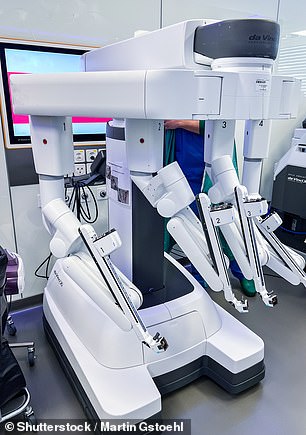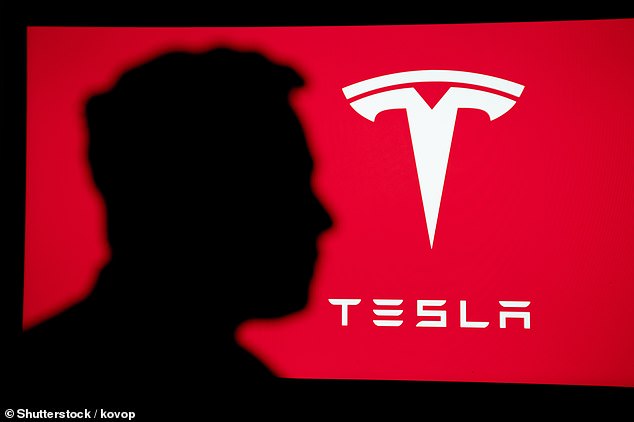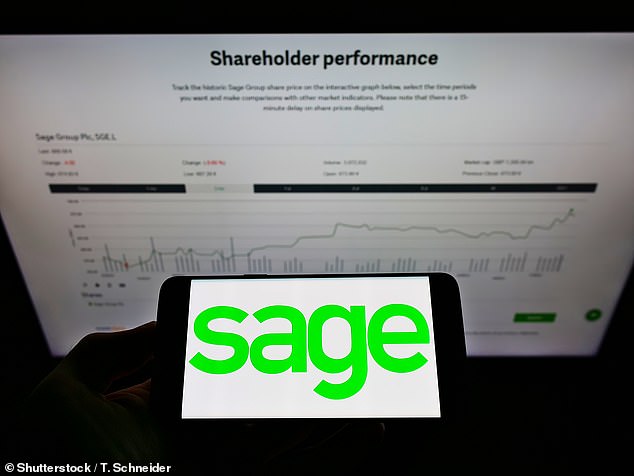I’m an investment expert – here’s why I’m backing robotics manufacturer Intuitive Surgical

Each month, This is Money puts a senior fund or investment manager to task with tough questions for our series, Where Experts Invest:
We want to know where they’d invest for the next year – or even next 10 years – and what pitfalls to avoid.
This week, we spoke to Paul Niven, fund manager at F&C Investment Trust.
The trust invests across the world in publicly listed companies, as well as a range of unlisted securities and private equity.
The total value of its assets currently equates to around £6 billion and F&C trades at a discount of around 9 per cent to its net asset value.
In the hot seat: We quiz Paul Niven on where he finds value, the best country to invest in, whether Bitcoin and Tesla are worth it and the age-old question of growth versus value
1. If you could invest in only one company for the next 10 years, what would it be?
Paul Niven replies: While currently a small holding for us, one name that we believe has strong potential for future growth is US listed company, Intuitive Surgical.
They are the world’s leading manufacturer of robotics for surgery, with their da Vinci range.
They dominate the industry, are moving into a wider range of procedures and enjoy network effects because of the thousands of surgeons already trained on their machines.
2. What about for the next 12 months?
Smurfit Kappa, the manufacturer of paper-based products.
We are just starting to emerge from the trough of the cycle and their market position has been strengthened.
They are buying the second largest player in the US at the bottom of the cycle on trough earnings with strong potential for synergy gains.
Current valuations are attractive with scope for upgrades to earnings over the next year.
3. Which sector should people be most excited by?
Semiconductors are at the forefront of the move to Artificial Intelligence and are worth knowing about – both in terms of their growing importance and the risks associated with investing in this area.

Sunnier times ahead: The share price of Smurfit Kappa is up 25 per cent year to date and Paul Niven thinks there is much more to come over the next 12 months
4. What sector would you be avoiding?
There are an awful lot of players in the auto sector, and with the rise of electric vehicles, in particular from China, it is hard to have confidence in who the winners of the future will be.
5. Which country offers the best value for investors?
While long-term growth opportunities may be more attractive elsewhere, the UK market appears attractive in valuation terms across a number of metrics.
It is cheap compared to its own historical performance and relative to other markets, boasting the lowest sector-adjusted price-to-earnings ratio amongst major developed markets.

Tip: Paul Niven says Intuitive Surgical, a manufacturer of robotics for surgery, has big growth potential over the next 10 years
6. Over half of your fund’s holdings are US based. But isn’t the US looking expensive at the moment?
The US is indeed trading at a relatively rich level of valuation against its own history and relative to other markets.
Nonetheless, the US market has consistently delivered a premium rate of growth in corporate earnings and one should expect to pay a premium level of valuation for future growth.
7. Should investors target growth or value stocks?
We have relatively balanced exposure between growth and value stocks in our portfolio at present.
Growth stocks still appear relatively richly valued, but may well benefit from upcoming cuts in interest rates and appear well placed to benefit from secular growth themes.
The discount which value stocks are trading at currently, however, also presents an interesting opportunity for investors.
8. Tesla – will it ultimately boom or bust?
Despite recent weakness in its share price Tesla is still a relatively expensive stock and a lot of hope of future growth is still in the price.
Competition is intensifying in Electric Vehicles, but Tesla will likely end up being one of the leaders in autonomous vehicles.

Pricey: Niven thinks Tesla remains valued based on future growth expectations but will face stiff competition from the rest of the auto sector
9. Gold – should this form part of everyone’s portfolio?
Not necessarily. While gold can enhance portfolio diversification and act as a ‘safe haven’ during economic uncertainty it does not generate income and can be volatile, making it not suitable for everyone.
The recent rise in gold prices hasn’t necessarily followed typical economic fundamentals, suggesting recent central bank purchases might be driving the rally.
I prefer equities as an investment from a long-term perspective.
10. What about bitcoin?
Bitcoin can also diversify a portfolio and offer potentially high returns, but I regard this as a speculative investment with questionable fundamentals.
Extreme price volatility makes it inappropriate for everyone’s portfolio. Over the past few years, bitcoin has behaved similarly to a leveraged, digital version of gold.
The recent sharp rallies in both assets suggest the market has suddenly placed a higher value on assets that cannot be degraded by inflation or by bank failures.

Too volatile: Niven sees bitcoin as a speculative investment and not appropriate for everyone’s portfolio
11. What do you see as the biggest geopolitical threat to global stock markets this year?
Escalating tensions in the Middle East could impact oil prices and disrupt supply chains.
A longer-term concern is the rising tension between the US and China, encompassing trade conflicts, technology disputes and potential military confrontations over Taiwan.
12. Do you think UK banking shares are undervalued?
Rises in interest rates have transformed their profitability, dividend yields are very high and their very high capital levels means they are undertaking huge share buybacks.
While they have re-rated modestly, they remain cheap and current returns may well be more sustainable than most investors believe.
13. Is there a UK technology firm that stands out for you?
Despite disappointing results last week, Sage is still growing its top line strongly with the Intacct business growing at 27 per cent in the US and other newer product lines growing even more quickly as Sage transitions from an onsite accountancy software business to a Cloud based recurring revenue subscription provider of software services for Small and Medium Enterprises.

British gem: Sage, a British software company has seen its share price rise by more than 40 per cent over the past five years despite disappointing results last week
14. Do you think Brexit has cost the average UK investor?
Uncertainty surrounding Brexit has likely led to weaker economic growth and foreign investment outflows, driving some of the underperformance from UK equities relative to major global markets.
However, UK investors with exposure to overseas markets have benefited from the 10 per cent depreciation of sterling.
15. Will interest rates return to rock bottom again?
Slower economic growth, tighter credit conditions and falling inflation should give central banks confidence that their policies are sufficiently restrictive.
Interest rates are likely to remain higher than the rock-bottom rates of the past decade, but I expect the base rate to fall below 4 per cent next year.
16. Do you think inflation is transitory or here to stay?
Transitory. Consumer price inflation slowed to 3.2 per cent in March 2024 and should fall to around 2 per cent in April after a reduction in regulated energy prices.
Services inflation is expected to decline in April and will likely continue easing throughout 2024 as wage growth gradually slows.

Inflation: After peaking in October 2022, the rate of CPI has been easing lower and getting closer to Bank of England target levels of 2 per cent
17. Would you have done things differently if you had been governor of the Bank of England?
I would have raised rates earlier to head off inflation but would now be looking to cut rates at upcoming meetings given the benign outlook for inflation and signs of a cooling labour market.
18. You inherit £100k tomorrow. What would you do with the money?
I would spend on a family holiday and some indulgent experiences to provide lasting memories from the bequest, use some to fund never ending household improvements and, with what is left, increase my personal holding in F&C Investment Trust.
Some links in this article may be affiliate links. If you click on them we may earn a small commission. That helps us fund This Is Money, and keep it free to use. We do not write articles to promote products. We do not allow any commercial relationship to affect our editorial independence.




